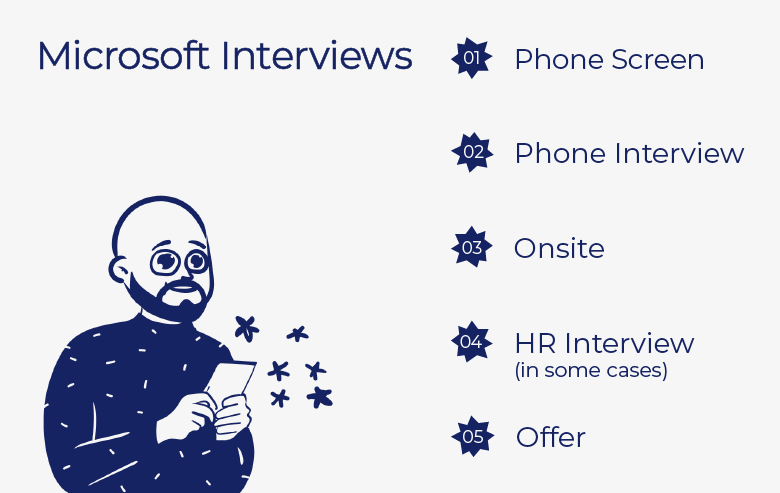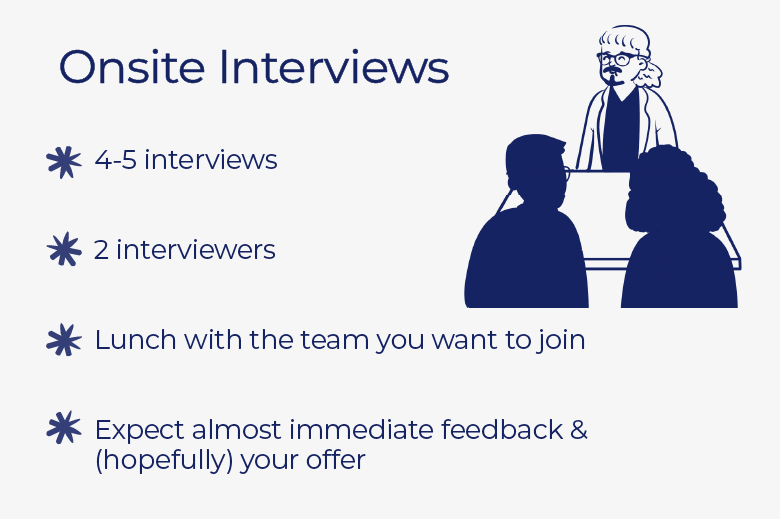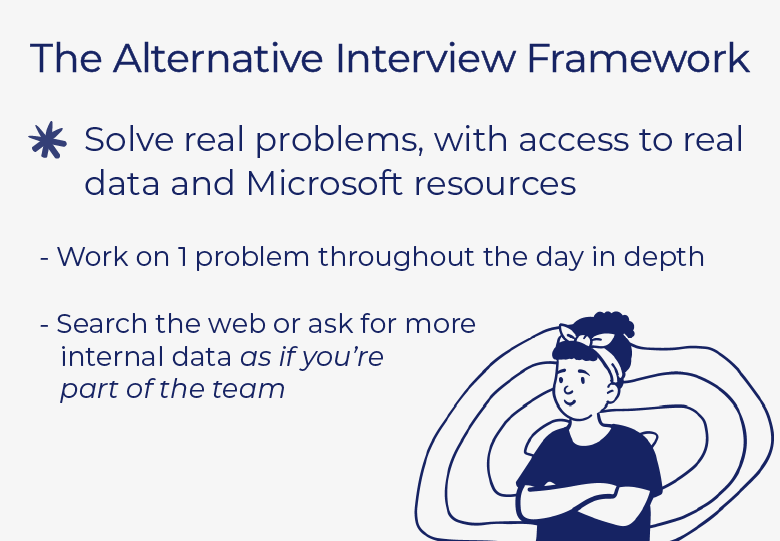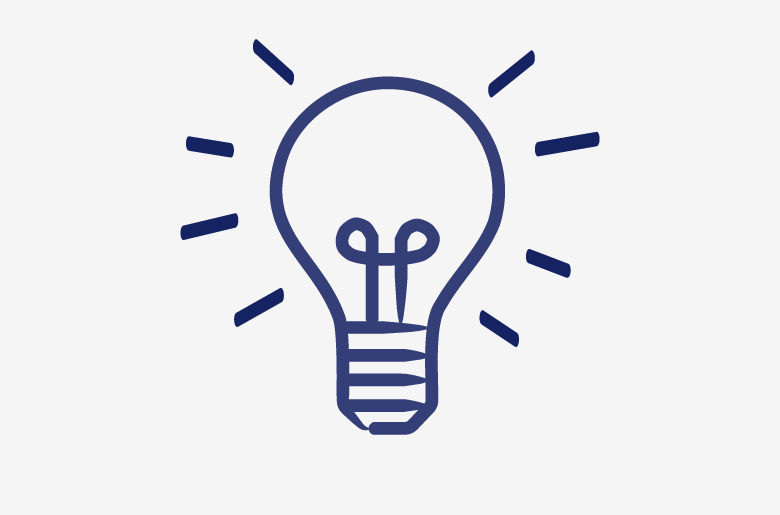Decoding the interview process at Microsoft
Insider info about the interview process and recently asked questions.
Under the leadership of CEO Satya Nadella (who has an approval rating of 98% on Glassdoor), Microsoft revamped its hiring process in recent years into one that is surprisingly humane -- and abbreviated.
No more brain teasers asking why manhole covers are round (sorry, Google), a poor proxy for gauging a candidate’s ability to solve real business problems.
Additionally, the Microsoft hiring team recognized that some of the most talented candidates don’t perform well under pressure and designed the interview process with that in mind. Consequently, some hiring managers disclose the interview questions or send practice questions ahead of time so candidates can prepare and present their best self.
In a blog post explaining Microsoft’s overhauled interview process, John Mongtomery, corporate VP of program management, wrote:
“It’s not like going into work every day is a surprise, so why should an interview be?”
The company also reputedly offers a more generous compensation and benefits package than some of the FAANGs, especially for software developers. Bear in mind, however, that these perks have only made Microsoft a more attractive employer, making job interviews in Redmond pretty competitive.
So how do you prepare for this increasingly competitive interview? We're breaking down the process from start to finish, including how you should prepare.
The Microsoft Interview Process

How long is the interview process?
The majority of applicants on Indeed report getting hired within two weeks (24%) or one month (23%). Campus placements sometimes take longer, extending into 1-2 months.
How is it structured?
At Microsoft, there is no fixed interview process or format-- it varies between product groups and teams. However, the most common process consists of 4-5 rounds focused on testing the analytical, problem-solving, and technical skills of the candidate.
1. Phone screen
Like in any standard phone screen, you will walk through your resume. The recruiter will also ask behavioral questions to gauge your curiosity, openness to learning. and leadership qualities.
For developer or engineer roles, the phone screen is slightly longer (45 minutes) and consists of technical questions about data structures and algorithms. One coding question will be administered through a shared editor, and you will have 30 minutes to develop a solution, similar to a remote whiteboard exercise. While C# is Microsoft’s proprietary programming language for the Windows.NET framework, developers aren’t required to know any specific language.
2. Phone interview
While this is most common in technical roles, other folks may also be asked to complete a phone interview. This will happen 1-2 weeks after your phone screen, if all goes well.
The recruiter will share an agenda and potential questions/topics ahead of time. Remember that in each subsequent round, the people interviewing you are higher up in the organization. Therefore, make sure your communication skills are sharp and your professionalism shines through.
For engineering roles: Engineers may be asked to do a second phone interview with a senior developer or engineering manager. Candidates are expected to understand data structures such as arrays, stacks, queues, linked lists and hash tables, as well as algorithms such as breadth-first search, depth-first search, quicksort, mergesort and divide and conquer.
3. On-site interview

For non-developer roles, most candidates who pass the phone screen will move directly to this stage. They will interview onsite at the Microsoft location for which they are applying (Seattle, Redmond, or the Bay Area), all expenses paid by the company. During the coronavirus pandemic, interviews are being conducted virtually.
This round usually consists of a full day of 4-5 continuous interviews. Here's how it's structured:
- Each interview is conducted by two people: Microsoft interviewers work in pairs to provide a broader perspective on the candidate and eliminate unconscious bias.
- You’ll meet employees and managers for the team you’re looking to join for an hour each.
- During a regular onsite interview, you’ll have lunch with the team, which is also considered a portion of the interview process.
- After each round, interviewers will mark the candidate as ‘hire’ or ‘no hire.’ If a candidate receives three ‘no hires’ they may be sent home early.
The last person you interview with during your onsite is known as an ‘As-Ap’ or “As Appropriate.” Similar to the “bar raiser” at Amazon, this person, together with the hiring manager, has veto power over your hiring. This is a key part of the Microsoft interview experience that you should not underestimate.
Microsoft isn’t known for leaving people hanging: Some candidates report receiving an offer during their onsite interview or immediately after.
4. HR interview
Within one week of their onsite interview, candidates either receive an offer or rejection, or are invited back for one final HR round. Current and former Microsoft employees on Quora describe it as mere formality: the hiring manager does a final interview consisting of behavioral and technical questions to ensure you’re the right fit, and to discuss salary and benefits.
How to Succeed During the Interview

Understand the alternative interview framework
You’ll be asked to solve real business problems at Microsoft. Under Microsoft’s ‘alternative interview framework’, candidates are provided with access to the same data as the team, and they are allowed to search the web or source additional data internally.
Product management candidates are asked to work on a single problem throughout the day during their onsite interview, going from understanding the customer issue to executing a solution and placing it in front of the customer.
Software developers are expected to have a strong sense of system design and be ready for questions during the coding interview that include sorted arrays, recursion, binary search trees, and more. As with other technical interviews, you will sometimes be asked to use a whiteboard.
Know upfront which teams or product groups you want to join
Microsoft hires for specific teams or product groups (eg: Azure, Sharepoint, Dynamics, Office), so you need to know which ones best suit your skills. If you’re unsure, do your research and work with the recruiter to determine the best fit. Have expertise in cloud computing? You probably belong with Azure, Microsoft’s public cloud service. If you’re interested in building consumer-facing software applications, you might thrive on the Sharepoint or Office team.
While Microsoft has over 8,000 jobs listed on LinkedIn, recent reports show that Microsoft has frozen hiring for specific teams during the pandemic. Azure currently appears to be hiring more than any other team, according to Forbes, as Microsoft “focuses on optimizing its cloud services for responder organizations and critical government agencies worldwide.”
Interview Questions Asked by Microsoft Recruiters

Your best prep resource...
If you're preparing for Microsoft and want to know if you're ready for a phone screen or campus interview, join our private community. Once you're there, you'll gain access to hundreds of practice questions, including behavioral, system design, and technical interview questions to try out.
Recently asked questions...
Behavioral interview questions:
- Tell me about the most challenging project you ever worked on.
- What motivates you?
- Tell me about a time you faced a difficult team member.
- Why do you want this job and what can you bring that we don't already have?
- Tell me about a time when you faced conflict within a team, and how you dealt with it
- How do you get people to agree with your point of view?
- What would you do if you were asked to work on a project but the requirements were vague?
- Tell me about a time you failed.
- Why are you leaving your current job?
- Tell me about a time you went beyond what was expected.
👉 Try it out: Practice Microsoft Interview Questions recruiters asked in the last 60 days
Product/marketing and program manager interview questions:
- Tell me about a product that you think is marketed well and why?
- What is your favorite microsoft product and how would you market it?
- We want to introduce one of our data analytics products to small businesses. How would you market it to them?
- How do you know what your customers want?
- Design a three-button remote for the television.
- How would you explain cloud computing to your grandmother?
- How would you design an alarm clock for deaf people?
- If you were a PM on Microsoft Surface and Delta asked you to design the perfect airline entertainment system, what would you do? Walk through your thoughts and pitch it.
- How would you motivate users to use your app every single day for a month?
- You are king of an island. You want to switch which side of the road everyone drives on. How do you go about doing it?
👉 Try it out: Practice Microsoft Interview Questions recruiters asked in the last 60 days
Technical interview questions (software engineers and support engineers):
- How do you keep your engineering skills sharp and learn new technologies outside of your work environment?
- Give us one example of a project where your initial assumptions were incorrect. Describe the steps you took that uncovered this and what steps you took after.
- What is the difference between C++ and Java?
- Given an infinite list, how would you find and then remove the second to last element in the list?
- Explain the concept of big O notation.
- Design a method that removes every other node from a linked list.
- How does the internet work?
- What is the difference between standard modules and class modules?
- Why is code optimization important?
- How does Microsoft classify security threats to its software?
👉 Try it out: Practice Microsoft Interview Questions recruiters asked in the last 60 days
The information provided herein is for general informational purposes only and is not intended to provide tax, legal, or investment advice and should not be construed as an offer to sell, a solicitation of an offer to buy, or a recommendation of any security by Candor, its employees and affiliates, or any third-party. Any expressions of opinion or assumptions are for illustrative purposes only and are subject to change without notice. Past performance is not a guarantee of future results and the opinions presented herein should not be viewed as an indicator of future performance. Investing in securities involves risk. Loss of principal is possible.
Third-party data has been obtained from sources we believe to be reliable; however, its accuracy, completeness, or reliability cannot be guaranteed. Candor does not receive compensation to promote or discuss any particular Company; however, Candor, its employees and affiliates, and/or its clients may hold positions in securities of the Companies discussed.
